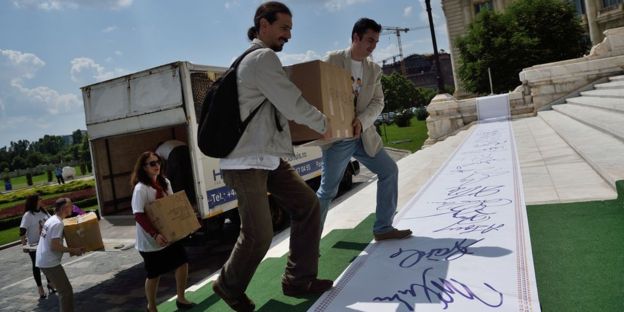What can you do when you can’t win a battle and when “loosing in style” is not an option?
Romanian civil rights fighters found the answer: if you can’t win, make sure your opponents don’t win either!
For the past 3 years, Romanian LGBT people had been living with a sword over their heads: a petition by the nebulous “Coalition for Family” had collected 3 million signatures back in 2015 (over an electorate of 18 million) calling for a referendum to change the constitution’s definition of marriage and restrict it to the union of a man and a woman.

In 2016, the Coalition for Family delivered its millions-strong petition to the senate (Getty images)
Not that this mattered much in real terms: the Civil Code already had this discrimination enshrined and banned same-sex marriage in Romania. But such a change would obviously give the conservatives an enormous moral authority, which is what they were after.
After much back and forth, the referendum was eventually announced in for October 6 and 7, 2018. The war was declared open.
And the predictions weren’t great: figures published by the Coalition claimed that 90% of the electorate supported the constitutional change. With polling figures indicating that only 27% of Romanians would support even just a registered partnership, this figure seemed plausible. And even if the figures had been inflated, winning the referendum was clearly out of sight. But “loosing forward” by gaining some sympathy from a margin of the society was not an option either: the moral authority gained by the attackers would have closed the lid on any progress for LGBT people for the foreseeable future.
The only chance not to loose was to torpedo the referendum by making it invalid. And this required that less than 30% of the electorate turned up. Going for a boycott of the referendum appeared like the only solution, albeit risky.
The good thing is that with 3 years in waiting, the referendum hadn’t found the LGBT activists unprepared.
Teodora Ion-Rotaru from the historic LGBT organisation ACCEPT had a most timely expertise in voting behavior: “With a deeper analysis of figures, we identified that about 34% of the electorate would actually really turn out to vote. So we had a clear objective of driving this figure down as much as possible. We also found out by asking people for their motivations to vote that only 21% reported that they would vote because they cared about the topic. Others indicated other reasons, such as wanting to be a good citizen, or because they cared deeply about the right to vote, a right that had been stripped of its meaning in the communist area, which after all ended only 30 ago”.
With these figures in sight, the strategy became clearer as it now identified more specific target groups: the voters who didn’t deeply care about the issue. ACCEPT commissioned some more demographic research into this group and realised that it stretched across very diverse age groups, economic statuses, geographic locations, education levels, etc.
But how could these voters be addressed?
Teodora further comments: “Research had shown that campaigning on LGBT rights was falling on death ears. Support and sympathy levels are too low in the country to expect people to act on them. So it was important to frame the issue differently.”
The campaign chose to focus on very specific frames: Common sense and Respect. Triggering common sense would make people resist being manipulated by politicians. And triggering respect would play into one of Romanian society’s deepest held value.
These frames were then adapted to target the different segments of the target group: for people with low income, the argument was put forward that the referendum was a disgraceful waste of money. Mothers were alerted on the fact that it took away precious money from school meals. And so on for every specific group.
The campaign also clearly chose to fight back on the terrain of family values, which were not to be left to the opposition. Campaign videos were created that featured interviews with different types of families with children, from traditional to mono-parental. These videos aimed to counter the assumption that you could not explain to children what same-sex unions were. These videos also aimed at creating emotional connections between all families.
Another piece of good news for the LGBT campaigners was that they were not on their own: The fact that the conservative attackers were after moral authority more than after concrete restrictions on the rights of LGBT people, dramatically weakened their argument, as they were calling for something that …already existed!
And their quest for moral authority infuriated all the progressive social movements who found this war without stakes a perfect battle ground: after all, they could fight the conservative reactionary wave without needing to take a stand on the rights of LGBT people. Tudor Bradatan from the netizen organisation Declic confirms “this referendum was just a forerunner for a wider conservative crackdown. We had to be there to defend the frontlines of democracy and human rights, which is our mission.”
For ACCEPT’s Teodora, the involvement of a large alliance of 100+ civil society groups in the anti-referendum campaign was the result of 22 years of ACCEPT’s own support to many civil rights struggles over the years.
 A man sits draped in a rainbow flag in a nightclub in Bucharest, Romania on Sunday after learning election results. A referendum to redefine marriage as between a man and a woman failed to attract the minimum number of voters and the result was invalidated. Andreea Alexandru/AP
A man sits draped in a rainbow flag in a nightclub in Bucharest, Romania on Sunday after learning election results. A referendum to redefine marriage as between a man and a woman failed to attract the minimum number of voters and the result was invalidated. Andreea Alexandru/AP
The community-based organisation MozaiQ was born three years ago as a reaction to the Coalition for Family’s collection of 3 million signatures. Chairperson Robert Ratiu underlines “this initiative was what tipped the scale: all progressive movements felt that enough was enough”.
And the very vocal support for the referendum from the extremely unpopular government came in as a blessing in disguise: With a large part of the population in fury against their government, the campaign against the referendum wisely framed the resistance against the referendum as a resistance against the government, and against what was being perceived by many as a return to the communist-style authoritarian regime.
And LGBT organisations were not the only ones to take up arms. The creative agency Papaya entered the ring and in consultation with ACCEPT developed a video that definitely aimed at producing an electroshock !
To understand the tactic behind this video, it has to be understood that the leader in the video is clearly identified by viewers as being Dragnea himself; what the children sing is the party’s slogan, the 3 roses featured in the video remind of the party’s logo. The video is clearly reminiscent of the communist area, with strict school uniforms, corporal punishment, indoctrination, etc.
The video was released only days ahead of the referendum, so that the Coalition for Family would not have time to react.
Was that strategy to shock the undecided into abstention effective? The low turnout at the referendum seems to suggest it was. It was in any case seen by almost everyone in Romania, as it was screened several times during prime-time TV talk shows.
According to Tudor Bradatan “it’s sometimes necessary to not only be ‘nice guys’ but to also show teeth and hold a mirror to the face of hateful attack”.
One of the many assets of the campaign was that it could count on different players, targeting different groups.
For MozaiQ, the objective was also to help the LGBT community cope with the impact of the referendum. Says Robert “for a long time we thought we might loose the referendum and even when we became more hopeful we knew that the anti-LGBT attacks would leave many people terribly hurt. The campaign “You can’t vote on Love” aimed to provide the community with a positive messaging that would lift their spirits”.
MozaiQ aimed for celebrities to provide their clout to the action. Although coming out for support to LGBT rights is still a lot to ask for many “opinion leaders”, the organisation managed to secure 10 high level supporters with whom high quality video were shot. Interestingly, the diversity of the celebrities allowed the campaign to reach very diverse target groups, even if this hadn’t been strategized beforehand.
Emil Rengle spune că iubirea nu se votează
Emil Rengle: "În iubire suntem față în față cu noi înșine. Iubirea nu se votează" #boicot #boicotreferendum
Publiée par MozaiQ sur Mardi 25 septembre 2018
These videos were aired by major TV channels, even by those who did not also air messages from the pro-referendum campaign.
For MozaiQ, the choice not to brand the videos was a fundamental part of their success.
According to MozaiQ, the campaign proved very successful, with a level of engagement hardly ever seen on other campaigns, with each story viewed 1500 times out of a Facebook page membership of 2000.
This campaign generated spontaneous video contributions from supporters, which were also shared on the campaign’s social media channels, fuelling the virtuous circle of engagement.
In the days before the referendum, another initiative surfaced that clearly aimed at giving a lighter tone to the debate and appeal to the moderate more modern voters.
With the slogan “Don’t vote, make love instead”, the cheeky video encouraged…. abstention, but not in bed ! It pays off to be daring: the video got almost 1 million views (remember the country’s population is 18 million!)
(The video has no English caption but it’s pretty much self-explanatory!)
De referendum stai acasă și fă dragoste
Tu ce faci de referendum? #staiacasă #iubește #boicot
Publiée par MozaiQ sur Mardi 2 octobre 2018
A further initiative was a social experiment bringing together straight and LGB people in an exercise to rewrite the country’s Constitution, which clearly showed that same-sex marriage was the least of people’s concerns.
On October 7, LGBT campaigners stopped chewing their fingers and let a broad smile light up exhausted faces. Only 21,1% of voters had shown up. Clearly, many Romanian had chosen to make love, not war on sexual and gender diversities !!
Lessons: When your attacker doesn’t win, the winner is you !
For Declic’s 400 000 supporters, the issue was controversial. Research showed that 20% actually supported the referendum. The rest was mainly indifferent. Engaging in the battle was not without risk. In the end, Declic’s membership only decreased by 400 people.
Campaigning experience has shown that audiences have a very limited attention span and get tired very quickly: for a campaign to be effective, it has to be short and just ahead of the vote.
When your issue is being used as a smokescreen to deflect from other major issues, call it out relentlessly. Even people who don’t support you don’t like being manipulated !
Your supporters could be a hazard! Says ACCEPT’s Teodora: “Ironically we also had to persuade the supporters of LGBT rights NOT to turn up and reject the referendum. This would only have served to make the referendum valid and make our attackers win. It’s not easy to ask your supporters to stay silent in the face of vicious attacks but we hammered the message that boycotting the referendum was the only relevant way to oppose it”.
Most of the undecided electorate could effectively be targeted by allied group, such as Declic, precisely because they were not LGBT and therefore credible messengers.
For MozaiQ, one of the clearest lessons was that success comes when egos go: “the danger was so real that organisations and individuals forgot their individual concerns and pulled their sleeves up to work together. These were not times for internal disputes or displays of ego”
Count your blessings…in disguise! Days before the referendum, when the conservatives saw that their chances of victory were fading, they played out a clever trump card and got their allies within the government to extend the voting period to two days instead of one.
With most parties supporting[1]the referendum, it became clear in the eyes of many voters that this turned out to be a referendum in support of the political establishment. Clearly a ball and chain!
For MozaiQ’s Robert Ratiu, with a lot of negative attacks from everywhere including from parts of the movement, campaigners can easily be demoralised and disoriented. It’s important to talk as much as possible with all sorts of people, to test your assumptions and take advice.
For ACCEPT, one of the main assets of the campaign was that organisations had built positive relations with the media over many years. This proved to be essential to secure fair coverage.
The anti-referendum campaigns was often unbranded. In contrast, the Coalition for Family played the opposite strategy and aimed at building a centralised branded campaign. This made it look like a very institutional initiative, with a lot of foreign funding and support, which clearly put a lot of people off.
Sometimes a modest unbranded campaign can attract more sympathy than a branded roller coaster.
[1]“Union Save Romania” party had a clear stance against the referendum, and encouraged the boycott.

